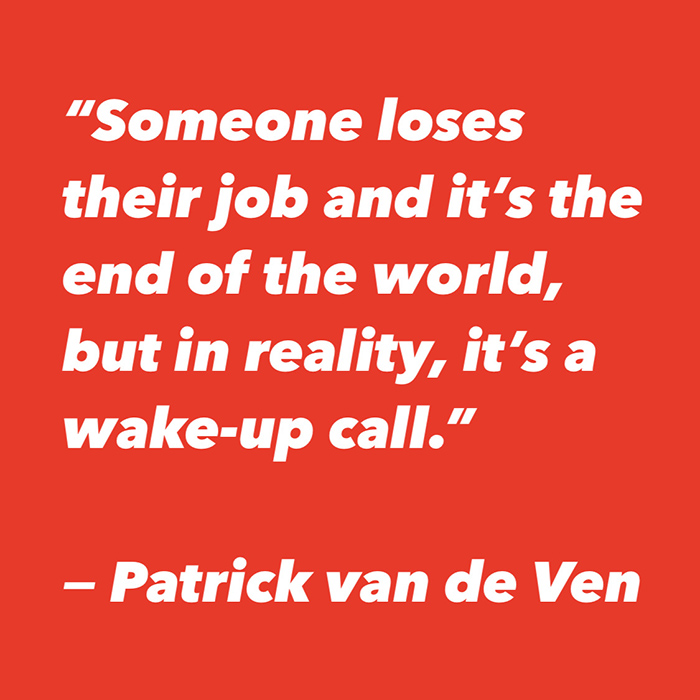Outplacement offers advantages to both employees and employers. Here’s how


By Patrick van de Ven, founder partner of Venturn, a Netherlands-based consultancy to manage change and organisational development in the international maritime and logistics industry. Patrick was scheduled to speak at Breakbulk Europe 2020, so we are delighted to feature his insight here on BreakbulkONE.
Reduced demand, halting of projects, and a decrease in new commercial opportunities force companies to downsize their workforce in the short term to stay afloat. For employees, this threatens their job security—the guarantee that they will keep the same job.
But job security has been under attack for years now. The modern professional is better off seeking employment security instead: the guarantee that they will always have work. Employment security means becoming independent from a single role by being able to flexibly apply professional skills and knowledge in new areas. In good times, helping your staff grow their employment security is often done through talent and development programmes that offer benefits for both the company and the employee.
How can you still make the best out of a bad situation in lesser times and turn employees into life-long ambassadors for your organisation, even as your paths diverge? Outplacement could be the answer.
Overcoming shock
Outplacement programmes are usually offered once a member or part of a company’s staff becomes redundant due to a reorganisation, outsourcing of tasks, return from expatriation, or other developments that require a reduction of the workforce. No matter the reason, getting laid off can come as a huge shock and leave an employee feeling lost as to what they should do now. It’s not just the loss of their job itself that is emotionally challenging; their daily routine and their relationship with their co-workers is completely disrupted as well.
In the past 20 years, Venturn’s founding partner Patrick van de Ven has been closely involved with numerous clients in the development of outplacement programmes. He highlights that the very first step of outplacement is helping someone process the news of their dismissal. “Especially for people who haven’t switched jobs often in their lives, the process of finding a new one can be daunting. Supporting them in this temporary phase helps them come out of it faster and better. Offering them an outplacement says: you’re not alone in this. We’re going to help you.”
Road to recovery
After this initial stage of emotional processing, recovery can begin. The end goal of outplacement is clear: finding a suitable and sustainable new working environment. What this means differs from person to person. The whole process is therefore tailored to the individual: Who are they? Which competences do they possess? What do they aspire to? Developing a clear self-image through various assessments is necessary to present interesting and realistic new job opportunities to the participant.
“Participating in an outplacement programme doesn’t mean that the employee sits back and waits for a job to be handed to them. Applying for jobs is almost a profession in itself,” Patrick said. “It’s a collaborative process and it’s essential for the person to be truly motivated to find joy in and at work again.”
In addition to job assessment and orientation, intensive coaching should be part of outplacement. Coaching often focuses more on interpersonal skills, such as communication and leadership styles, rather than the abilities required to fulfill job-specific tasks. This holistic approach ensures both professional and personal development throughout the entire process. An outplacement takes five to six months on average, but may continue for longer until the job seeker has secured an appropriate new form of employment.
Opportunity of a lifetime
In addition, outplacement is about more than job hunting. Through the process of being outplaced, people gain valuable insights about themselves that will enrich their career even after the programme is finished. People usually have a very limited view of their abilities and opportunities. Getting outplaced offers an opportunity to seek out your true passion, instead of continuing on the same career path until retirement.
“There’s this scene from the movie Up in the Air that always comes to mind when I talk about outplacement,” Patrick said. “Someone loses their job and it’s the end of the world, but in reality, it’s a wake up  call. It’s your chance to find true joy in your work.”
call. It’s your chance to find true joy in your work.”
The shock of getting laid off can relieve someone of the ‘path dependency’ they experience when it comes to their career. Instead of doing what they’ve always been trained and paid to do, they’re forced to think: what do I actually want to do? Over the years, Patrick has seen people make extreme life changes through outplacement time and time again.
“The most recent example I can think of is the director of a shipping line that I ran into. After leaving that role, he spent time in Thailand and discovered his passion for their cuisine. Now he’s a restaurateur!”
Value creation
But why would an employer invest in someone they’re letting go anyway? “The value of outplacement for the employer comes down to how much importance you place on being a good employer and realising your ‘duty of care’,” he said. Guiding someone towards their next step is a great way to maintain a positive relationship that can create business opportunities in the future. When you part on good terms, that person is much more likely to stay an ambassador even if they don’t work for you anymore.
In some industries especially, a positive recommendation or just knowing the right person in the right position can open doors for you no marketing campaign ever could. Outplacement is a powerful asset in employer branding as well.
“It’s not just a sign of goodwill for the person who’s leaving,” he said. “It’s reassuring for the people who are staying behind to see that you take responsibility as an employer even when it’s hard.” By offering outplacement, an employer shows their commitment to their staff even when they can no longer offer a satisfactory workplace. When better days for the business arrive, that successful employer branding and being able to leverage the network of ambassadors ‘in the field’ makes it much easier to attract new talent.
Navigating the obstacles
Despite the benefits of outplacement, an employer may still opt for the traditional severance or transition payment instead. It’s then up to the employee to invest this payment in an outplacement programme. “Usually, they will be held back by the thought: ‘that’s a lot of money, I’ll try by myself first’,” Patrick said.
It’s hard to predict how someone will look back on the decision not to go through with outplacement. “Most people luckily don’t have previous experience with these situations, so they don’t know for sure whether outplacement will be useful to them,” he said. “They’ll only be able to evaluate that after the fact. Some people find a new job just fine without outplacement. In a lot of cases, however, it’s the start of a delayed process that ends in reintegration—at which point, you’ll be even further behind.”
While outplacement offers more value for both employer and employee in the long run, it’s certainly a more complex way of saying goodbye to an employee than offering them a handshake and a bag of money. Most organisations don’t have the resources or know-how to realise an effective programme for the employees being outplaced. They turn to outside experts instead, who—aside from having the knowledge and experience—aren’t tied up in company politics. Without being tied down by personal bias, hear-say and company loyalties, the outplacement mentor is therefore able to keep a truly open mind to all the possibilities that the world holds for the outplacee. After all, when one door closes, another one is just waiting to be pushed open.
About the author
 Patrick van de Ven founded his own company in 2001 with the goal to inspire and empower professionals from all levels. Since attaining his Master’s degree in Maritime Science, he has built a decades-long track record of realising change management and organisational development in the international maritime and logistics industry. Patrick believes change is the only constant and is passionate about supporting clients and candidates in navigating that change successfully.
Patrick van de Ven founded his own company in 2001 with the goal to inspire and empower professionals from all levels. Since attaining his Master’s degree in Maritime Science, he has built a decades-long track record of realising change management and organisational development in the international maritime and logistics industry. Patrick believes change is the only constant and is passionate about supporting clients and candidates in navigating that change successfully.
About Venturn
Venturn’s philosophy is that people and performance are inseparable. Their core activities include business consultancy, interim services, executive search and training and development. By investing in human capital, they renew organisations, improve processes, and drive innovation in the international supply chain.
Visit www.venturn.nl for more information.
Subscribe to BreakbulkONE and receive more industry stories and updates around impact of COVID-19.


